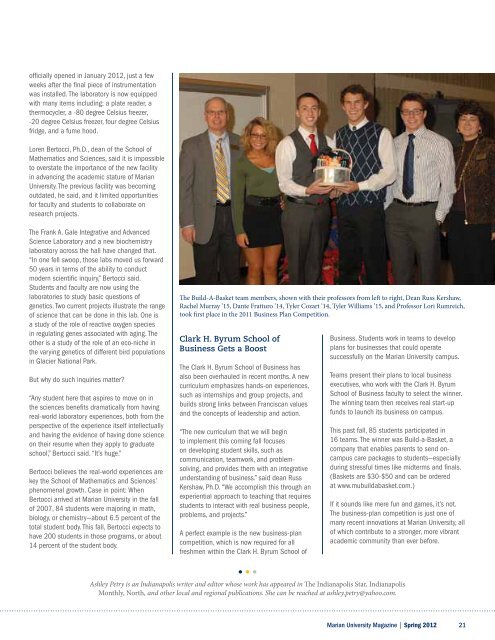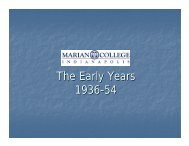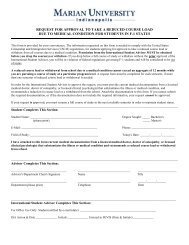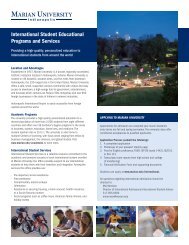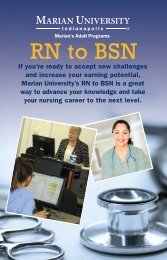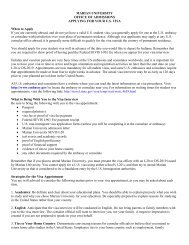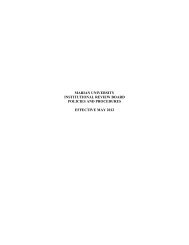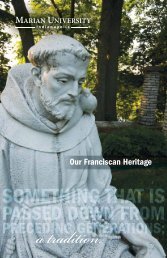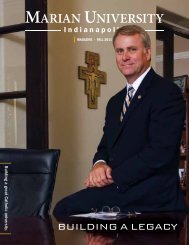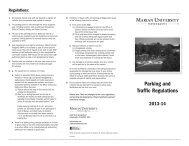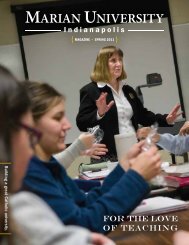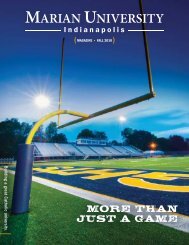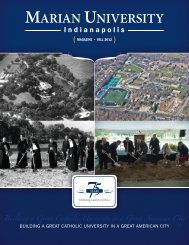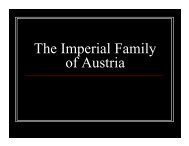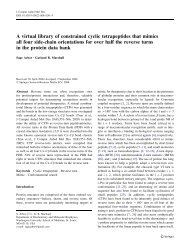MU_Magazine_SP12-final - Marian University
MU_Magazine_SP12-final - Marian University
MU_Magazine_SP12-final - Marian University
You also want an ePaper? Increase the reach of your titles
YUMPU automatically turns print PDFs into web optimized ePapers that Google loves.
officially opened in January 2012, just a few<br />
weeks after the <strong>final</strong> piece of instrumentation<br />
was installed. The laboratory is now equipped<br />
with many items including; a plate reader, a<br />
thermocycler, a -80 degree Celsius freezer,<br />
-20 degree Celsius freezer, four degree Celsius<br />
fridge, and a fume hood.<br />
Loren Bertocci, Ph.D., dean of the School of<br />
Mathematics and Sciences, said it is impossible<br />
to overstate the importance of the new facility<br />
in advancing the academic stature of <strong>Marian</strong><br />
<strong>University</strong>. The previous facility was becoming<br />
outdated, he said, and it limited opportunities<br />
for faculty and students to collaborate on<br />
research projects.<br />
The Frank A. Gale Integrative and Advanced<br />
Science Laboratory and a new biochemistry<br />
laboratory across the hall have changed that.<br />
“In one fell swoop, those labs moved us forward<br />
50 years in terms of the ability to conduct<br />
modern scientific inquiry,” Bertocci said.<br />
Students and faculty are now using the<br />
laboratories to study basic questions of<br />
genetics. Two current projects illustrate the range<br />
of science that can be done in this lab. One is<br />
a study of the role of reactive oxygen species<br />
in regulating genes associated with aging. The<br />
other is a study of the role of an eco-niche in<br />
the varying genetics of different bird populations<br />
in Glacier National Park.<br />
But why do such inquiries matter<br />
“Any student here that aspires to move on in<br />
the sciences benefits dramatically from having<br />
real-world laboratory experiences, both from the<br />
perspective of the experience itself intellectually<br />
and having the evidence of having done science<br />
on their resume when they apply to graduate<br />
school,” Bertocci said. “It’s huge.”<br />
Bertocci believes the real-world experiences are<br />
key the School of Mathematics and Sciences’<br />
phenomenal growth. Case in point: When<br />
Bertocci arrived at <strong>Marian</strong> <strong>University</strong> in the fall<br />
of 2007, 84 students were majoring in math,<br />
biology, or chemistry—about 6.5 percent of the<br />
total student body. This fall, Bertocci expects to<br />
have 200 students in those programs, or about<br />
14 percent of the student body.<br />
The Build-A-Basket team members, shown with their professors from left to right, Dean Russ Kershaw,<br />
Rachel Murray ’15, Dante Fratturo ’14, Tyler Cozart ’14, Tyler Williams ’15, and Professor Lori Rumreich,<br />
took first place in the 2011 Business Plan Competition.<br />
Clark H. Byrum School of<br />
Business Gets a Boost<br />
The Clark H. Byrum School of Business has<br />
also been overhauled in recent months. A new<br />
curriculum emphasizes hands-on experiences,<br />
such as internships and group projects, and<br />
builds strong links between Franciscan values<br />
and the concepts of leadership and action.<br />
“The new curriculum that we will begin<br />
to implement this coming fall focuses<br />
on developing student skills, such as<br />
communication, teamwork, and problemsolving,<br />
and provides them with an integrative<br />
understanding of business.” said dean Russ<br />
Kershaw, Ph.D. “We accomplish this through an<br />
experiential approach to teaching that requires<br />
students to interact with real business people,<br />
problems, and projects.”<br />
A perfect example is the new business-plan<br />
competition, which is now required for all<br />
freshmen within the Clark H. Byrum School of<br />
Business. Students work in teams to develop<br />
plans for businesses that could operate<br />
successfully on the <strong>Marian</strong> <strong>University</strong> campus.<br />
Teams present their plans to local business<br />
executives, who work with the Clark H. Byrum<br />
School of Business faculty to select the winner.<br />
The winning team then receives real start-up<br />
funds to launch its business on campus.<br />
This past fall, 85 students participated in<br />
16 teams. The winner was Build-a-Basket, a<br />
company that enables parents to send oncampus<br />
care packages to students—especially<br />
during stressful times like midterms and <strong>final</strong>s.<br />
(Baskets are $30-$50 and can be ordered<br />
at www.mubuildabasket.com.)<br />
If it sounds like mere fun and games, it’s not.<br />
The business-plan competition is just one of<br />
many recent innovations at <strong>Marian</strong> <strong>University</strong>, all<br />
of which contribute to a stronger, more vibrant<br />
academic community than ever before.<br />
Ashley Petry is an Indianapolis writer and editor whose work has appeared in The Indianapolis Star, Indianapolis<br />
Monthly, North, and other local and regional publications. She can be reached at ashley.petry@yahoo.com.<br />
<strong>Marian</strong> <strong>University</strong> <strong>Magazine</strong> | Spring 2012 21


